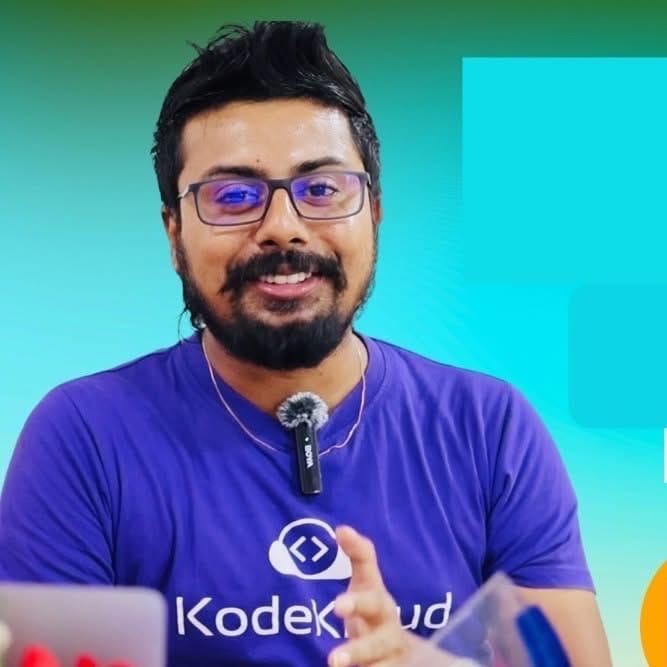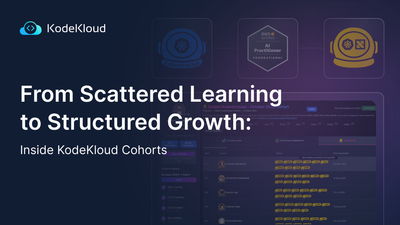If you didn't study programming in school and want to become a Developer, it might feel like it's too late for you. It might seem that there's too much to learn and you're at a disadvantage. But that's not true. Pretty much anyone can learn how to code.
Usually, people worry that the syntax and the words used in a programming language are the hard part. But that's actually the easy part. The questions you should be asking yourself are: "Will I enjoy programming? Will I get satisfaction from solving problems as a developer? Or will I find it frustrating?"
To learn more about where to start your coding journey, watch this video.

At its core, programming is when you break down a big problem into very small steps that the computer can understand. Here are a few signs that tell if you'd enjoy being a developer and might even turn out to be a great one:
1. Math always made sense to you. You found it easy to understand and logical. Generally speaking, math is also about breaking down a big problem into smaller, connected steps. So, solving a math problem is very similar to solving a programming problem. If you were good at math, you'd probably be good at programming, too.
Even if you didn't find math straightforward, you can still be a decent developer. But, generally speaking, math wizards will write code faster and easily. Their fingers will fly on that keyboard. People who find math a bit harder to understand will struggle with programming, at least on some days, or complex projects. They'll take a longer time to come up with that same piece of code.
2. You always loved logic games. For example, when you play PC games, you find solving puzzles a bit more enjoyable than action sections. You like both parts of the game, but it feels slightly more satisfying when you figure out some smart way to open a door rather than when you shoot up a bunch of aliens. And that's why you'll see this big trend among developers: most are also pretty passionate video gamers.
3. You're a linear, well-organized thinker. There are usually two kinds of people when it comes to thinking. Some go from A to B to C to D, and so on, in an organized, step-by-step fashion. This is linear thinking. Other people jump all over the place, start from A, think about D, come back to B, go to C, and then back to D again. It's not necessarily a bad way to think. Creative people are usually like this, as this chaotic type of thinking generates new ideas more easily. But to find programming easy, you should be the A, B, C, D type of thinker.
4. You lean more towards logic rather than feelings. The emotional side of the brain and the logical one are sometimes in conflict. Some people trust the emotional side more, others the logical one. For you, the choice is easy. Even if you feel a certain way, you still analyze the situation and take a cold, hard look at things. And if logic says to do the opposite of what you feel, then you do that. In your view, logic is rarely wrong, but feelings often lead to bad choices.
5. You're a fast learner. You can quickly connect the dots and make sense of how something works, even if it's your first time using that new thing. As a kid, you probably disassembled your toys, trying to figure out how they work.
6. You can easily think of algorithms to simplify problems. For example, imagine this scenario. A user can type a number between 1 and 1000. If he picks 1, the screen should turn red. If he picks 2, it should become green. Finally, if he picks 3, it should become blue. Then, the same applies to the rest of the numbers. Four is red, five is green, six is blue, 7 is red, 8 is green, nine is blue, and so on.
Now, imagine the user types 500. What color is this? It would be pretty time-consuming to count each color from 1 to 500 just to see the answer. But you can think of an algorithm that lets you more easily solve such a problem. Basically, you find a system that lets you answer this question faster without counting from 1 to 500. If you always looked for "hacks" and "tricks" in school to learn easier or solve problems faster, you will probably be in your element as a developer.
Now, could you think of an algorithm to solve this task with the three colors? Pause reading if you want to solve this yourself.
Here's a possible solution:
We can see that numbers that divide perfectly to 3 are blue: 3 is blue, six is blue, and 9 is blue. What about red? 4 or 7 are red, and we can see that the number 3 fits into four exactly once, but we get a remainder of 1 if we make that division. We see the same thing by dividing 7 by 3: 3 fits into 7 two times, and we're left with 1, our remainder to that division. With similar logic, we'll see a similar story for 5 and 8 corresponding to green. 5:3=1 with a remainder of 2 and 8:3=2 with a remainder of 2.
So, we can sum this up:
If the remainder of a division to 3 is:
- 1, the color is red
- 2, the color is green
- 0, the color is blue
If we divide 500 by 3, we'll see that 3 "fits" into that number 166 times. And 166*3=498, so we get a remainder of 2. Which means the color should be green.
So here we have an example of how math-type logic can be used with programming. If you can think of such an algorithm, then coding it into software is rather easy. It's just a matter of telling the computer:
Divide the number picked by our user by 3, and remember the remainder of this division
- If the remainder is 1, the color red
- If the remainder is 2, the color green
- If the remainder is 0, the color blue
Once you're familiar with the keywords and syntax of your programming language, this is as simple as typing some sentences into a text editor. Coming up with the algorithm is the hard part.
If this example makes perfect sense for you, you should probably become a developer. There's a high chance you'll enjoy this job and become quite good at it relatively fast. And, of course, you'll earn a nice income while you're doing it!
So what do you think? Is programming for you? Don't know where to start? Well, how about learning Python and Go? These two programming languages are very hot and in demand right now.

People are also reading:

















Discussion